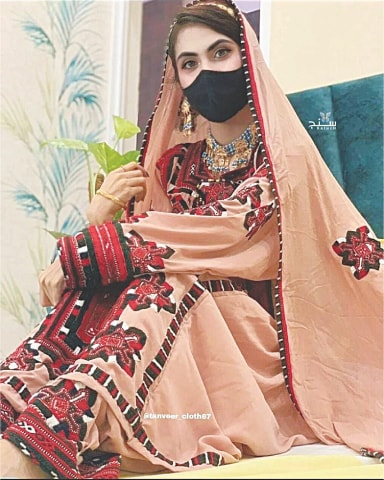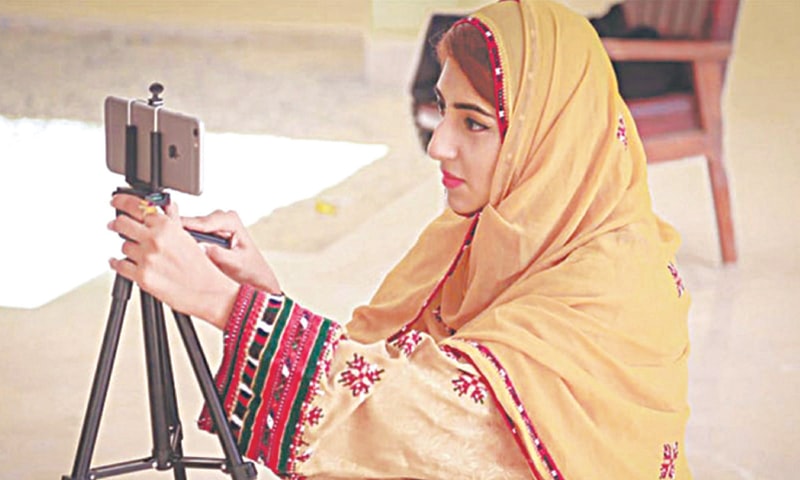
It took Anita Jalil months to convince her father to allow her to start vlogging [video blogging] on YouTube. Eventually, her father agreed — marking the beginning of Jalil’s journey to become Balochistan’s first female vlogger.
Hailing from Gwadar, Anita struggled with vlogging at first, as the idea of women having a public presence or talking about their everyday lives on social media was an alien concept in her environment. In the initial days, Anita’s father would sit by her side when she edited her vlogs and ask her to edit out shots he didn’t like — such as shots of her clothes or make-up.
In her vlogs, Anita covered various programmes happening in Gwadar for her channel, talked about her daily life and raised issues, such as those of electricity and water in Gwadar, a city termed as the China-Pakistan Economic Corridor’s (CPEC’s) ‘crown jewel’.
Slowly, Anita garnered an audience and her work started getting noticed outside of Gwadar. A team from BBC Urdu travelled to Gwadar to do a story on her, titled ‘Balochistan Ki YouTube Star Anita Ko Lakhon Loag Kyun Follow Kartay Hain? [Why Do So Many People Follow Balochistan’s YouTube Star Anita?]’, after which she was invited to various morning shows on television.
In conservative Baloch society, the idea of Baloch women placing themselves in the public eye is sometimes unthinkable. But more and more young vloggers are asserting themselves on social media and changing mores in the process…
“My father started realising that I was doing good and, now, he is one of my greatest supporters,” Anita says. However, she tread a difficult path, paved with trolling and abuse — both online and offline.
“I still remember that once a male relative told me that, ‘You have ruined our family name, we have never seen a Baloch woman show herself and her life on YouTube, you should remove our family’s name and remove your Baloch identity too’,” she recalls. “There were 15 to 17 male family members in the room. What hurt me more than the remark itself was that my father didn’t take a stand for me then, but he supports me now.”
TROLLING AND HONOUR

Hostility came not only from her family. Anita says she received negative comments and was trolled online, which took a mental toll on her.
“I had to be on sleeping pills because I wouldn’t be able to fall asleep thinking about the negative comments I was getting,” she recounts. “I developed anxiety — in the beginning I received many life threats. During the nights, I wouldn’t be able to fall asleep in the fear that someone might enter my home and murder me.”
Five years since starting her journey, Anita still receives hateful comments online but the fact that many opportunities have come her way because of her vlogging and knowing she has played a role in bringing about a change, makes her content.
Like many societies in South Asia, Baloch families too place the burden of upholding their ‘honour’ on women. Females who post their pictures online or have an active and public social media profile are often treated as having breached the ‘righteous’ social code.
For this reason, Tilyan Aslam, who hails from Turbat and who started vlogging in 2019 while she was on an exchange programme in the USA, thinks such Baloch women are ‘rebels.’
Tilyan started posting vlogs on her channel to share her experiences with other girls back home and kept an active presence on Instagram and Twitter — talking about various topics, such as mental health and self-love. As a university-going student, she no longer finds the time to vlog but remains active on other platforms.
“When you start doing something new, people generally pour hate and want you to do everything as per their wishes,” she remarks, explaining why she had to take a break from social media.
“They start pointing out flaws in everything. Comments like, ‘You’re not wearing a Baloch dress’, ‘You’re not speaking in Balochi’ or ‘You haven’t covered this and that topic’. People have fat-shamed me or commented on my facial structure or been rude. Sometimes I open Instagram to character-assassinating comments that lower my confidence.”
Tilyan says that while her parents are supportive, her extended family — that is, her aunts, uncles and cousins — didn’t give a positive response to her online presence.
“I have stopped going to family gatherings because of the amount of hatred and negativity that I get,” she says. Because of the taunts, her parents have sometimes indirectly advised her to reduce her social media activity.
Despite the challenges, ranging from family disapproval, facing discomfort in male-dominated public areas and receiving backlash online, more and more Baloch females have, in fact, taken up their cameras to start vlogging and maintain an active online presence.
NEVER QUITE RIGHT

Yasmin Ghani, a final year student at University of Turbat, is the first vlogger from Turbat. Ghani is also the youngest Radio Jockey (RJ) from her city.
Belonging to a conservative community, where women are generally confined to the chaadar and chaardiwari, ie away from the public eye, means young women like Yasmin have to be conscious of what they put out as content creators.
“When I started making videos and uploading them in 2018, I received a lot of criticism, which made me wonder what I should be doing to change this,” says Ghani. She started to appear in traditional Baloch dresses, covering her head with a scarf and speaking in Balochi in her videos, in attempts to placate her audience.
“I had some content in mind that I couldn’t produce because I knew the society I belong from won’t accept it,” she laments. “Even though my language is not understood worldwide or nationwide, I would speak in Balochi in my videos to gain acceptance. I made vlogs in Urdu in the beginning, but I was criticised for that.”
In her videos, she has covered many events in Turbat, interviewed many emerging Baloch artists and touched upon various topics.
“Some remarks left me scared too,” says Yasmin. “I would be told that, in the society I live in, women are killed in the name of honour. I continued for the sake of bringing about a change — I thought that if I stop, then my society would remain stagnant.”
The idea of a female from Baloch society uploading her pictures is a radical one, even in the 21st century, so when this happens, the pictures are often reposted, used in reels or uploaded elsewhere without seeking permission.
WITHOUT PERMISSIONS
Tilyan Aslam says that she has tried to educate people on this matter — telling them it is not only unethical but a cybercrime too. “People are never ready to listen, and this is one of the main reasons why Baloch girls don’t use social media — there is the fear that their pictures will be used without consent and not everyone has supportive families.”
“Stealing content as well as pictures is a very common thing and, if this is pointed out, people respond by saying this is part and parcel of having a public account,” says Sanj Baloch, a vlogger from Karachi who started her YouTube channel two years ago. “They don’t understand the concepts of copyright or consent or the effort that goes behind making the content.”
Sanj vlogs with a mask and keeps her face covered and, yet, she too has been on the receiving end of hateful comments online. Many fake accounts of hers have been made on Facebook and TikTok.
“Someone once shared a fake account which had a lot of followers and I posted this on my Instagram to inform my audience it wasn’t me,” she says. “People started telling me that this person was talking to them on Facebook impersonating me.”
Over time, many women from Baloch society have started fighting these outdated social norms by starting their YouTube channels and creating public accounts on social media, where they voice their opinions and share content.
When Anita started out, she was the only Baloch female vlogger. But this has changed — there are many Baloch female vloggers on YouTube now, from Balochistan as well as the Baloch diaspora living abroad, showing various aspects of Baloch society, and they receive positive and encouraging comments as well.
Even if one frame at a time, things are surely changing.
The author is a freelance feature writer. She tweets @sommulbaloch
Published in Dawn, EOS, August 6th, 2023













































Dear visitor, the comments section is undergoing an overhaul and will return soon.